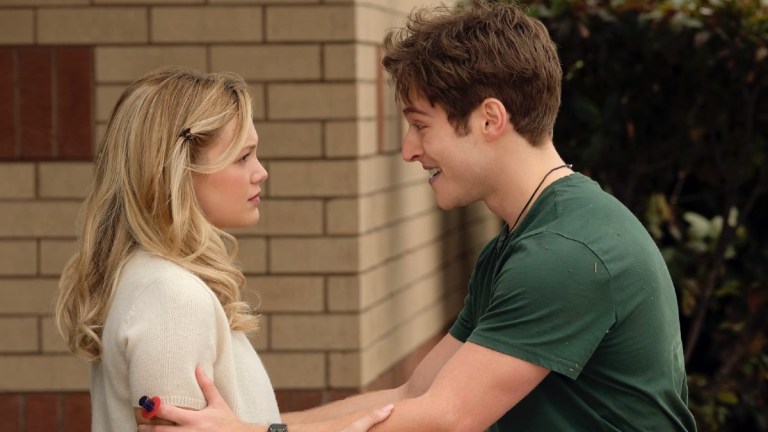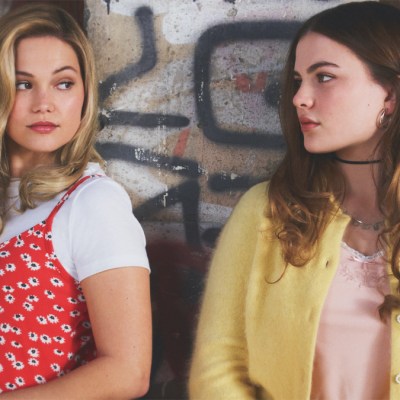How Cruel Summer Recontextualizes Our Understanding of Teenage Trauma
Before Impeachment: American Crime Story arrived, Freeform's Cruel Summer got the conversation started on how culture treats young women.

This article contains spoilers for Cruel Summer.
The Freeform drama Cruel Summer is undoubtedly one of the best TV series of 2021, an addictive teen thriller with a story spread across three distinct timelines and an ending that manages to feel both completely inevitable and deeply shocking. (Plus, there’s the amazing 1990s soundtrack – truly a gift!)
Set in the aftermath of a kidnapping in a small Texas town, Cruel Summer follows the story of Kate Wallis (Olivia Holt), the high school queen bee held captive in her vice principal’s home, and Jeannette Turner (Chiara Aurelia), the former dorky nerd who remakes herself in her frenemy’s image in the wake of her disappearance (and is accused of failing to report her abduction). The show uses its split timeline format and a series of unreliable narrators to explore what really happened to Kate and what, if anything, Jeannette knew about her disappearance.
Although the series is full of the sort of jaw-dropping narrative twists that make for endlessly compulsive binge viewing, at its heart Cruel Summer is a story that subverts our expectations about what teen television can do. From the deft way that the series plays with our preconceived assumptions about who these girls are – and should be – to the way it uses its mystery framework to tell a complex story about trauma, grooming, and sexual assault, this is a show that consistently surprises in all the best ways.
And nowhere is that complexity more evident than when it comes to the character of Kate Wallis. On a less nuanced show, Kate would likely have been little more than a mean girl stereotype. She almost certainly would have been positioned as the villain of the series and viewers would have been urged to sympathize with the much more familiar teen drama protagonist Jeanette – an awkward girl with a secret dream of becoming popular. But that’s not what happens here at all.
Because while the surprising cliffhangers and time-jump-related twists of its central mystery may have driven internet buzz about the show – and a not insignificant number of truly bizarre fan theories – the question of whether Jeanette knew about Kate’s imprisonment was never the most important story that Cruel Summer was telling.
Instead, the show fearlessly digs into a much more complex topic: The often traumatic experience of teen girlhood, exploring issues that go well beyond the horrifying kidnapping at the show’s center. Through Kate and Jeanette, Cruel Summer deftly deconstructs how the unrealistic expectations placed on young girls damage their lives in unexpected and often unforeseen ways, encouraging them to chase elusive ideals of perfection, compete with one another for things like boys and popularity, and pretend to be people they aren’t.
On the surface, Kate Wallis is the teen idol of Skylin, Texas. Beautiful, rich, and popular, she’s dating a handsome football player and looking forward to a bright future. But beneath her seemingly charmed life, Kate is devastatingly lonely, trapped in a family and a social position that values her appearance more than her interiority. Everyone around her treats her like an object, happily projecting their preconceived notions of who she should be – a perfect daughter, an ideal student, a popular friend – onto her, without ever asking her what she really wants.
It makes perfect sense that Kate would be an easy target for a man like Martin Harris (Blake Lee), someone who makes sure that she feels seen on her own terms. While his motives are clearly nefarious – not to mention classic grooming techniques – Harris is also one of the few people that actually listen to Kate, encouraging her to share her feelings and fears in a way that no one else in her life really bothers to do.
Unlike some other popular teen dramas, Cruel Summer never glamorizes the relationship between Kate and Martin, working overtime to remind viewers that their connection is one born of abuse and manipulation. Their romance isn’t depicted as a dreamy fairytale or a rebellious act against a judgmental society, it’s a metaphorical prison that eventually turns into a literal cage. And in a world where shows like the mega-popular Pretty Little Liars not only depicts Aria dating one of her teachers for several years but marrying him at the series’ conclusion, well, suddenly Cruel Summer feels pretty revolutionary.
The series is part of a growing swath of mainstream television programs that seek to wrestle with and push back against these sorts of damaging assumptions. From the miniseries A Teacher to the reboot of Gossip Girl, the medium is purposefully deconstructing the formerly romanticized ideal of the teacher-student relationship and the complex power dynamics between young women and the people charged with educating or protecting them.
One of the biggest shows of the upcoming Fall television season is Impeachment: American Crime Story, a series that puts these dynamics front and center in its reevaluation of the Monica Lewinsky scandal of the early 1990s. The real-life events saw the world’s most powerful man take advantage of a young woman in his employ and then allow her to essentially be blamed for his (disgusting) actions. Its past time for us, as a society, to not only reckon with this specific case – and our collective lionization of Bill Clinton in spite of it – but with our need to put exploited young women into one of two boxes: A virginal damsel whose purity means she’s not responsible for anything that happens to her or a messy (read: normal) girl whose choices make her at least somewhat culpable for the things that did.
But one of Cruel Summer’s most crucial aspects is that Kate is not required to be perfect to earn the show or the audience’s sympathy. Our culture loves to blame young women for the bad things that happen to them, so the revelation that Kate first entered Martin’s house willingly is the sort of shock twist that all too often precipitates a problematic backlash. It’s her fault she went there in the first place. She deserved what happened to her. Here’s the thing she should have done differently. Why should we believe her now if she lied before? These are all the things that survivors often hear in the aftermath of their traumas.
Cruel Summer determinedly subverts typical TV storylines about sexual assault, never once entertaining the idea that Kate is anything other than a victim. Olivia Holt’s performance is a revelation, heartbreaking and furious by turns, as Kate wrestles with multiple forms of guilt and struggles to figure out who she is in the aftermath of what happened to her. And the show itself displays such consistent empathy toward her character, from the inclusion of the therapy sessions that feature her doctor explicitly explaining the concept and signs of grooming to the desperate chat logs that show her seeking any sort of community that might understand her messy emotions.
By the end of Cruel Summer’s first season, it seems as though Kate has reached at least a baseline level of peace, thanks to a boatload of therapy and allowing herself to remember what really happened during her last night at the Harris house. (She shot and killed Martin.) Though she’s still unaware of the fact that her initial suspicion of Jeannette was actually correct – if not precisely in the way she first assumed – it seems as though she’s finally ready to move on with her life. (Particularly if her kiss with Mallory is anything to go by.) But with the series renewed for a second season – where does Kate’s journey go from here?
Though there’s certainly a valid argument to be made that Cruel Summer should return as an anthology series and tell an entirely different story in its second season, there’s an equally compelling one that says truly showing us Kate’s journey back to herself is just as important. (There are also probably a fair number of fans who want to see Jeanette exposed, as well.) This show has been so thoughtful about the way it has depicted the effects of trauma and the lingering impact it can have on those whose lives it touches, surely Cruel Summer season 2 would handle the next stage of Kate’s story with the same nuance. And that certainly feels like a story worth telling – if only because it’s precisely the kind of teen story we rarely get to see.

